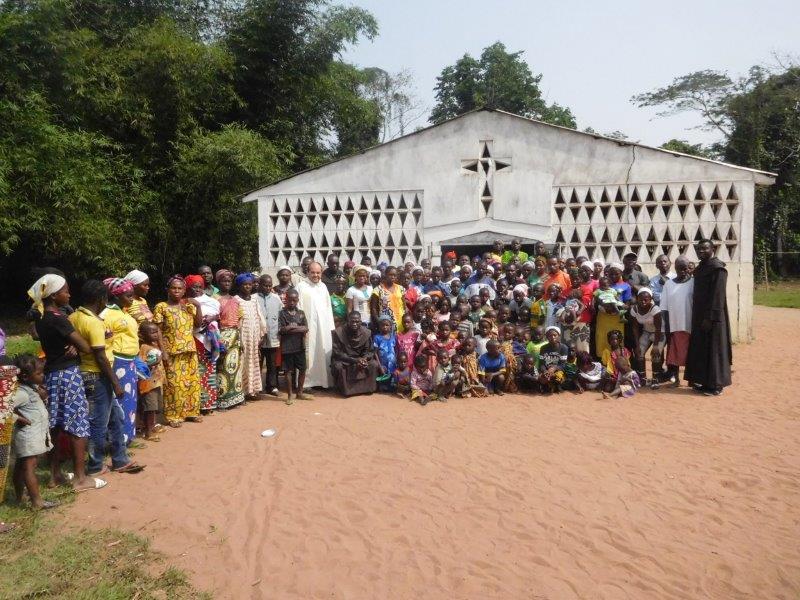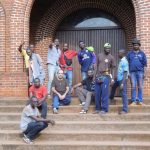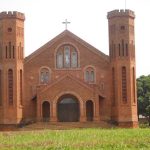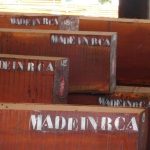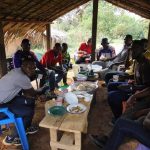Newsletter from the Carmel in Bangui, 20 –22 January 2018
Where does it say that we always have to celebrate Christmas on 25 December? On the calendar naturally, as my more observant readers will tell me. You are right, of course. Every calendar, sacred or profane, has 25 December marked in bright red letters to remind us all, from the most to the least observant, that this is the day on which the Most Important Person in history was born. But in the rainforest, with its dearth of calendars and liturgical experts, Christmas tends to arrive when the missionary arrives. And if you have a little time to spare, I will tell you about my second Christmas, one I had not expected which I celebrated in the Congo River rainforest, the greatest rainforest on the planet after the Amazon forest.
Generally speaking, during the days that follow Christmas – which I can assure you we at the Carmel also celebrated on 25 December, as the Church prescribes – we allow ourselves a few days of rest and fraternal fellowship, with perhaps a little trip out somewhere. This year we decided to head for the village of Bambio, where Brother Regis was born, 28 years ago. Bambio is around 180 miles (290 km) from Bangui, in the southwest corner of the country on the fringe of the Congo River rainforest. In order to reach this small sub-prefecture of Sangha-Mbaéré, you have to travel a long stretch of what is known as the Fourth Parallel, 4° north of the equator. Many sections of this road are in extremely poor condition. On two occasions our cheerful ‘caravan’ of 12 friars was obliged to push the car when it got stuck in the sand. We arrived in Bambio as night was almost falling. Just before we entered the village, we realised that we were already expected. The uncle of Brother Regis welcomed us with a smile, delighted at our arrival, and invited us to continue. Welcoming a missionary is something gladly done and generally quite customary. But 12 friars all together, all at once, was something they had never seen before in Bambio.
On arriving at the house of Brother Regis’ parents we realised that not only were we already expected but that our stay there had been organised down to the last detail, with a programme that would have been the envy of the best travel agencies and the most luxurious hotels. The entire village had literally mobilised for us. The proverbial African welcome was seen at its very best in Bambio. No sooner had we arrived that we were ushered into a dining hall built specially for us, a rectangular paillote, covered in bamboo leaves. And the women at once offered us fresh water or a cup of hot coffee to restore ourselves after the long journey. I chose coffee, which is something you do not buy here but which everyone cultivates for himself, just a few metres from the home. I took hold of the large white-enamelled aluminium mug and slowly sipped at the coffee – and could taste in it all the aroma of the forest, all the hard work of those who had grown it and the warm hearts of those who had prepared it. And I thought of the rest of you, anxiously searching for your “premium quality coffee” on the shelves of some boring supermarket…
We had been intending to sleep on the ground, as best we could, in the parish centre. But no way… A wonderful little wooden house had been made ready for us to sleep in, painted in deep blue, looking as beautiful as if it had only just been built. Our “apartment” consisted of four rooms, with mattresses for each person and a comfortable sitting room, which we adopted as a place of prayer and recreation. As the missionary, I got a bedroom all to myself, with a bed larger than the one in the monastery, plenty of mosquito netting and a little bedside table. Needless to say, all these privileges granted to the clergy were a source of envy and barbed comments on the part of my dear confreres…!
But of course, in addition to eating and sleeping, the guests must also have a place to wash in. We had all assumed that for these three days we would have to go without our daily shower, given the difficult conditions of the journey. But on the contrary, the village had prepared a bathhouse specially for us, observing all the niceties. And to the undersigned went the honour of inaugurating the new bathhouse, set up just a few metres from our accommodation. And here was Théophile, the youngest brother of Fra Régis, an impeccable majordomo, ready to supply our every need and to whom I tried to explain that my home town of Monferrato was almost as beautiful as his forest. With a look of firm decision he presented me with a splendid bucket full of water and explained – to a missionary undoubtedly accustomed to rather more refined toiletries – how you wash yourself in the forest. And a little later I can hardly believe that I am able to wash in hot water, with a brand-new block of soap, here in this corner of the Congo rainforest, in a bathhouse of wood and metal sheeting, with nothing but the stars for a roof.
During supper we discover that no priest has been to the village for some months and that as a result they have never celebrated the Christmas Mass. A mutual glance of understanding is sufficient between the brothers and myself: Tomorrow will be Christmas Day! The village was quickly informed. The following morning, all the people, in their Sunday best, began to gather the church and at 9 a.m. sharp Bambio’s belated Christmas celebration began. I discovered with pleasure that even though the priest had not come, nonetheless, the little church had been decorated festively, because the community had gathered there to pray on Christmas Eve and Christmas morning. The head catechist of the village was almost apologetic, saying, “If we had known in time, we could have organised better and had at least one baptism!” During the celebration I thought of these regions, evangelised in the past by intrepid missionaries but still suffering a lack of priests. And I watched my confreres, dancing and singing their way through the entire Christmas repertory of our monastery. There were just twelve of us, like the apostles. If those first twelve men, of whom we are merely the ambitious and imperfect imitators, succeeded in evangelising Galilee, Judaea, Samaria and then Asia and even as far as Greece and Italy, then surely we can at least manage to evangelise our little local area in Bangui, and the local prefectures of Ombella M’Poko, Nana-Mamberé, Ouham-Pendé and maybe even Lobaye and Sangha-Mbaéré as well?
After Mass we went to see the sub-prefect by way of a courtesy visit. We discovered that Bambio had been founded in the 1920s to house the plantation workers on the rubber plantations, the source of the rubber for the soles of the French soldiers’ boots during the Second World War. Then we travelled to Mambelé – a journey of around 25 miles (40 km) and lined all the way by giant trees – to visit one of the biggest sawmills in the country. The manager welcomed us warmly and explained to us every stage of this, one of the few still flourishing economic activities in the Central African Republic and a source of work for hundreds of people. And we were proud to discover that the timber from this forest is among the best in the world, being sold to the United States, China, Germany, France and Italy. It may even be that the furniture in your home is made from hardwood from this area.
Finally, the time came to say goodbye to Bambio, even though we would have been happy to stay there a few days longer. And of course, in the best African tradition, the guests cannot leave empty-handed. So three new passengers were added to our company: a monkey (captured by Brother Regis’ elder brother and already cooked, according to ancestral methods), a fine little piglet and a kid (not yet roasted, but not likely to see many days of 2018). And then some leaves of gnetum africanum – a sort of vegetable that looks almost like an ingredient for a magic potion – and a healthy supply of peké, a traditional drink that will guarantee the quiet inebriation of my confreres.
On the return journey we spent a night in the parish of Boda, a former mission of the Spiritan Fathers, now run by the Comboni missionaries. The parish church is a gem, built in the tropical colonial neo-Romanesque style. This town, which is rich in diamonds, was the scene of bloody fighting between Christians and Muslims during the war. Now however the Christians and Muslims are once more living peacefully side by side. The following day we made a brief visit to the waterfalls and then set out once more for Bangui. We ate lunch among the trees in front of the cathedral of M’Baïki, one of the most beautiful churches in Central Africa, and probably the work of the same architect as in Boda.
As we travelled along, I endeavoured to capture something of the animated discussions of my confreres in the Sango language… Timber, coffee, gold, diamonds… The riches of Central Africa… Bozizé, Djotodia, Touaderà, Seleká, Antibalaká – all the problems of the Central African Republic… Then Real Madrid, Barcelona, Liverpool, Paris St. Germain – the lighter side of Central Africa. Finally, the singing of Vespers uniting all the passions and thoughts, burdens and desires of this monastic community on four wheels. Then they all fall asleep and I think of their dreams – as large as the forest trees.
Back home again, a few days later, Brother Grâce-à-Dieu comes to thank me for the beautiful outing, which enabled him to get to know parts of his country he had never seen before. And then he assures me: “The Christians of Bambio, who were so happy with their belated Christmas celebration, have made me more determined than ever to become a priest.” The tree of Brother Grâce-à-Dieu has put down good roots. And God willing, his dream will indeed come true.
Love and blessings
Padre Federico Trinchero, ocd


